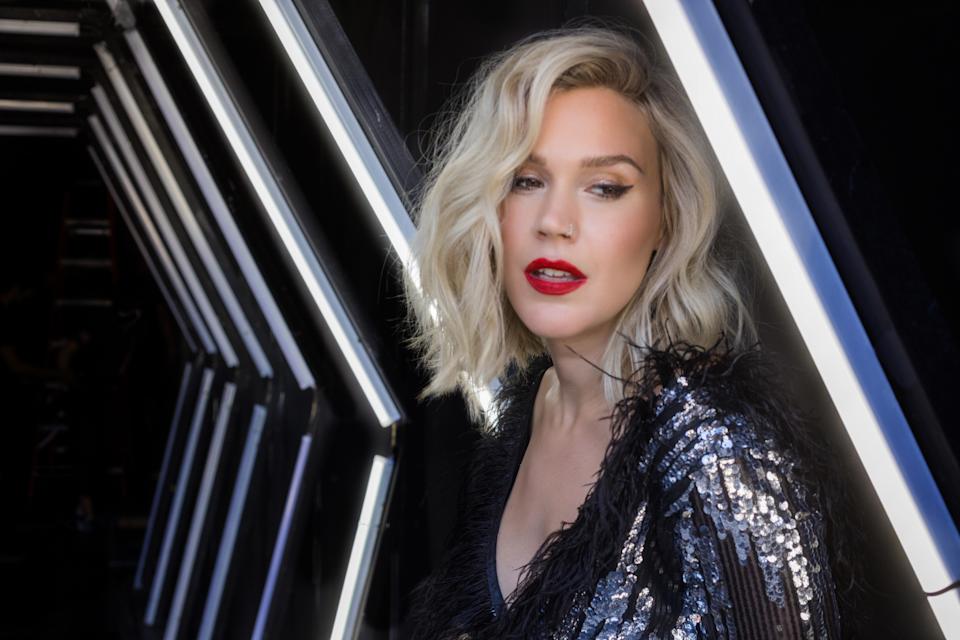British soul singer and former teen star Joss Stone returns this week with Never Forget My Love, her first studio album in five years. It also marks the first time she’s worked with her longtime collaborator, the Eurythmics’ Dave Stewart, who produced and co-wrote the record, in more than a decade. “I feel really nervous about it, because it’s been so long,” Stone admits to Yahoo Entertainment/SiriusXM Volume days ahead of the comeback album’s release. “It’s like, ‘Oh gosh, I hope people like it!’”
Stone has little reason to worry. Showcasing the big, booming vocals that landed her a label deal at age 14 and caught Stewart’s attention after he heard her first two records (The Soul Sessions and Mind Body & Soul), Never Forget My Love sounds like an epic collection of lost Bond themes. Recorded in 2020 at the start of lockdown at Stewart’s home studio in the Bahamas, then completed at Nashville’s famed Blackbird Studio, the album showcases the duo’s easy musical chemistry.
[embedded content]
“I was such a little girl,” the 34-year-old Stone recalls of her meeting with Stewart literally half her lifetime ago. “I was like 17, and I didn’t know I anything. I was very nervous.” But she kept her cool when Stewart invited her to work on his soundtrack to Jude Law film Alfie — even when he surprised her by telling her Mick Jagger would be swinging by the studio in five minutes to record a duet with her. “The whole thing was just a very crazy day. And ever since that day, Dave has called me to do mad things randomly, ever since. And I’ve always said yes. I never, ever would say no, because it’s always going to be a laugh. It’s always going to be really good music. And he creates that into stories for later.”
Stone certainly has her share of stories. She later ended up in a supergroup, called SuperHeavy, with Jagger, Stewart, Damian Marley, and A.R. Rahman (“That was quite the mad time, I have to say”); performed an impromptu duet with James Brown on Jonathan Ross’s British chat show; and teamed with a proudly bald Melissa Etheridge, who was undergoing cancer treatment at the time, for a historic Janis Joplin tribute at the Grammys. Stone’s teenhood mentor was even legendary “Clean Up Woman” singer Betty Wright. Certainly having the support and admiration of such music icons was validating, but as a young girl from Devon, England, Stone felt her authenticity was constantly questioned by critics, pundits, and various industry gatekeepers when she first exploded onto the scene in 2003.
[embedded content]
“God, I had that question so many times almost every single interview I did for the first five years of my career… at some point they would ask one of two questions: ‘Why do you not wear shoes onstage?’ — dunno why they’d want to know that! – and ‘How can you sing these songs and feel those emotion at the age of 16?’ And it always rubbed me the wrong way. And also they would ask me how I can do it being white, which I thought was so racist. I was like, ‘Whoa!’ For the first five years, I was struggling with that.”
Stone actually reveals that when S-Curve Records’ Steve Greenberg first signed her, “He was so he was so hell-bent on not having my face on the front cover. And I didn’t understand why. Now I do, but I didn’t understand why at the time. … He would go into people’s offices in the record industry and play my song, and he would go, ‘Tell me, where’s she from? How old is she? And what color is she?’ That was his game, like his party trick. … I think it was almost like me being a freak. It was like, ‘This little girl’s a freak — and she’s from England!’
[embedded content]
“I don’t know why Steve liked my voice, but for some reason he did,” Stone continues humbly. “He was like, ‘This girl likes soul music. This girl can sing live’ — that was a big thing for him. He was like, ‘People can’t do that. You can do that. You just need to be nurtured.’” It was Greenberg who then connected Stone with her first mentor, Betty Wright.
“She taught me so much, so much,” Stone says of Wright, who died in 2020. “She was amazing. She started when she was about 14, so she had the same career, in a way, that I had — she started so young and she had to lead a band, and she had to be brave and deal with the madness of this industry. And so to have her as my mentor was such a good thing for me, such a special thing. I started with her. We wrote a song first before we did anything else. It was ‘Right to Be Wrong,’ and basically the whole idea of the song was to say, ‘I’m gonna make mistakes, and they’re mine to make, and they are there to teach me and make me strong. You can give me all the negativity in the world, but I don’t need that; I’m going to stay focused on my path and it’s OK to make mistakes.’ That was really her concept. And I think the reason she did that was to give me strength throughout all this. And I still sing it. Every show, I sing it at the end.”
[embedded content]
Stone recalls “a few moments” early in her career when she felt she was disrespected — “photo shoots where they would want you to be like naked, and like I’m 17, you know?” There was even one Janis Joplin-inspired shoot, in an undisclosed year, when she was coerced into recreating a famous topless Joplin pose. “I felt really like, ‘I don’t wanna do that.’ I wasn’t a confident young girl like that. But I felt so under pressure, and this guy was like, ‘Please, come on, let’s just try. It’s a really iconic picture. I promise I won’t put it out.’ And I ended up doing that picture, and it didn’t come out, thank God. But why did I do that? Why did I even let him pressure me? I must have said no about 18 times. … It’s never been seen and it’s never come out, and I hope that it never, ever gets seen, but because I was so off afterwards. I said to my management, ‘You have to make sure that that photo doesn’t come out, because that’s not who I am.’ I didn’t want to do it, but I felt overpowered. … That should not happen. People shouldn’t feel pressured. People shouldn’t feel pressured to have a cup of tea, let alone take off your underwear.”
But for the most part, Stone recalls feeling protected in her career and having many people looking out for her, including Stewart, Wright, Greenberg, and Etheridge, who gave her one of her best pieces of career advice. “[Melissa] told me, ‘Honey, just go where it’s warm. That’s what you should do. Don’t do what is going to make you feel stressed-out. Don’t go there. If it feels bad, just don’t do it. It’s not a drama. Just go where it’s warm.’ And I live by that saying. It’s such a simple thing.”
[embedded content]
Stone, who is now the mother of a 1-year-old daughter, Violet, also credits her supportive parents with helping her navigate the business and avoid the pitfalls faced by many other young female singers that would “make my life miserable and make me say goodbye to my sanity.”
“When I hear those stories about Britney [Spears] and Amy [Winehouse], I always feel like I wish I’d known them. I wish I could have been there to support them in the way people supported me,” Stone muses. “I think knowing that you don’t have to do stuff is the main thing that maybe these people were missing. … If you feel like you have to do anything, you are going to be in a very uncomfortable place. You should feel like it’s always a choice. If there’s too many gigs and you are tired and you can’t sing or you feel sick, you do not have to do it — but people will come along and they will tell you that you have to. There are consequences to all of your actions, of course, but you have the right to choose. My parents instilled that in me from day one. … And I think some artists haven’t got the support. They don’t believe that they have choice, and that’s where they get broken. And then they get sad, and get sad forever. And I hate that.”
[embedded content]
The above interview is taken from Joss Stone’s appearance on the SiriusXM show “Volume West.” Full audio of that conversation will air Feb. 11 and be available later on the SiriusXM app.
Read more from Yahoo Entertainment:




